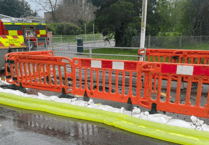MID and West Wales Fire Service will no longer respond to automatic fire alarms from July in a bid to 'optimise resource allocation'.
In a statement, the fire service, which covers Ceredigion, Powys, Pembrokeshire, Carmarthenshire and the Swansea Valley, will implement a new approach to Automatic Fire Alarm (AFA) calls.
The service says the aim is to 'optimise resource allocation, reduce unnecessary disruptions, and enhance overall efficiency in our emergency response.'
Automatic Fire Alarms (AFAs) are designed to detect the presence of smoke or flames and alert individuals to potential fire hazards.
However, statistics show that the majority of signals from these systems are indeed false alarms, often triggered by (but not limited to) cooking fumes, dust, or inadequate maintenance.
In a statement, MAWWFS said: "In light of this, from 1 July 2024, MAWWFRS will no longer respond to AFA calls, except in specific circumstances including residential premises, nursing and care homes, and premises subject to fire safety prohibition or enforcement notices."
Head of Corporate Risk and Area Manager, Peter Greenslade said: "As a service we attend in excess of 2,000 alarm actuations in commercial buildings every year with over 99 per cent of these calls being false alarms.
"This disrupts the community safety work that the Service can deliver, operational training for crews and introduces environmental and road risks that are unnecessary. Additionally, the businesses themselves are impacted due to the disruption caused.
"It is important that commercial premises take ownership of false fire alarms within their premises as is their legislative duty.
"We will of course always respond to 999 calls when people have identified that there is a fire."
The fire service added: "We would like to take this opportunity to reassure the public of the service’s unwavering commitment to emergency response and community safety, with this new approach designed to enhance service delivery and optimise resource utilisation."
A video released along with the statement states that MAWWFS have received on average 2,200 automatic calls annually, of which, 99.4 per cent are false alarms, with real incidents ‘usually’ verified with a 999 call.




